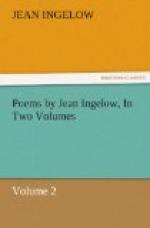A song
To one a dreaming: when
the dew
Falls, ’tis a time for rest; and when the bird
Calls, ’tis a time to wake, to wake
for you.
A long-waking, aye, waking till a word
Come from her coral mouth to be the true
Sum of all good heart wanted, ear hath heard.
Yet if alas! might love thy dolour be,
Dream, dear heart dear, and do not dream of me.
I sing
To one awakened, when the
heart
Cries ’tis a day for thought, and
when the soul
Sighs choose thy part, O choose thy part, thy part.
I bring to one beloved, bring my whole
Store, make in loving, make O make mine art
More. Yet I ask no, ask no wished
goal
But this—if loving might thy dolour be,
Wake, O my lady loved, and love not me.
’That which the many win, love’s niggard
sum,
I will not, if love’s all be left
behind.
That which I am I cannot unbecome,
My past not unpossess, nor future blind.
Let me all risk, and leave the deep heart dumb
For ever, if that maiden sits enshrined
The saint of one more happy. She is she.
There is none other. Give her then to me.
Or else to be the better for her face
Beholding it no more.’ Then
all night through
The shadow moves with infinite dark grace.
The light is on her windows, and the dew
Comforts the world and me, till in my place
At moonsetting, when stars flash out to
view,
Comes ’neath the cedar boughs a great repose,
The peace of one renouncing, and then a doze.
There was no dream, yet waxed a sense in me
Asleep that patience was the better way,
Appeasement for a want that needs must be,
Grew as the dominant mind forbore its
sway,
Till whistling sweet stirred in the cedar tree—
I started—woke—it
was the dawn of day.
That was the end. ’Slow solemn growth of
light,
Come what come will, remains to me this night.’
It was the end, with dew ordained to melt,
How easily was learned, how all too soon
Not there, not thereabout such maiden dwelt.
What was it promised me so fair a boon?
Heart-hope is not less vain because heart-felt,
Gone forth once more in search of her
at noon
Through the sweet country side on hill, on plain,
I sought and sought many long days in vain.
To Malvern next, with feathery woodland hung,
Whereto old Piers the Plowman came to
teach,
On her green vasty hills the lay was sung,
He too, it may be, lisping in his speech,
‘To make the English sweet upon his tongue.’
How many maidens beautiful, and
each
Might him delight, that loved no other fair;
But Malvern blessed not me,—she was not
there.
Then to that town, but still my fate the same.
Crowned with old works that her right
well beseem,
To gaze upon her field of ancient fame
And muse on the sad thrall’s most
piteous dream,
By whom a ‘shadow like an angel came,’
Crying out on Clarence, its wild eyes
agleam,
Accusing echoes here still falter and flee,
‘That stabbed me on the field by Tewkesbury.’




